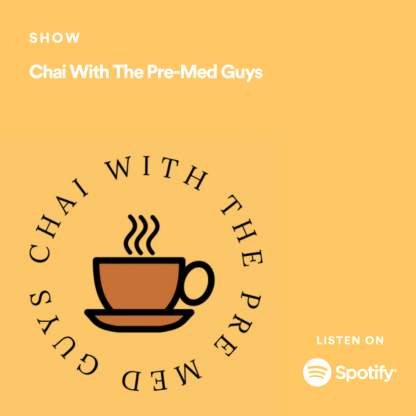
Pre-medical students Wali Prizada and Sayeed Khan are the masterminds behind a new podcast, Chai with the Pre-Med Guys, that offers experience and advice from current medical students.
Pirzada is a senior biochemistry major while Khan is a junior biology major and history minor. The pair bring on current medical school students as guests and explore their challenges, experiences and garner advice for fellow pre-med students hoping to apply to medical school.
They establish in their introduction that the podcast “stands for spreading relevant information on the journey to medicine, and being able to formulate your own path in this journey.”
The idea — which was originally thought of as an on-campus club, came to fruition this past summer. With the impact of COVID-19, the hope of starting any on-campus activities had dwindled significantly. Determined to carry out their podcast, Pirzada and Khan began constructing their own website. They also began cold-calling potential guests that they have found inspirational, in the hopes of holding meaningful conversations in lieu of Q&A sessions.
“We need to do some sort of background search to be able to ask about their passions. Our goal is to have genuine conversations, going deep into why they’re going into medicine, why they’ve done so well in XYZ category, to get the best conversation we can,” Khan said.
In their first episode, “Depth over Width,” they speak with Terrence Thomas, a Stony Brook University graduate, who shared his path from entering undergrad as a student-athlete studying athletic training and exercise science, to now attending Sidney Kimmel Medical College. In his sophomore year, Thomas realized that he was much more interested in the physiology, anatomy and chemistry courses that he was taking, and found himself drawn to the responsibilities being a physician entails. Consequently, he transferred to Stony Brook from the State University of New York College at Brockport.
In the episode, the pair discuss how many pre-medical students have the misconception that they need to conform to an image they think medical schools want, while sometimes sacrificing their other interests or passions. The common link between all of the episodes and stories of the guests is the idea that students should not mold themselves into what they believe an American Medical College Application Service (AMCAS) application should look like. Rather, many guests argue, students should package their interests into a coherent story with themes related to why they want to devote their lives to medicine.
“Don’t think about how you could spin this into a good application, think about what you’re passionate about and then when you get down to writing your application, analyze what you were really getting out of that experience at the end of the day,” Thomas advised in the episode. He also has a YouTube account, where he documents his own experience to help guide pre-meds.
Thomas’ sentiment stands with the guest in the second podcast, “The Road Less Taken.” Brandon Muncan, another Stony Brook University alum, now a first-year at Stony Brook’s Renaissance School of Medicine, graduated with Bachelor of Arts degrees in biology and sociology. His episode highlights the benefits of a connection between humanities and the sciences, and how they intertwine in medicine.
“I’ve always considered medicine a two-part game. Yes, the science is important, but we also have a person who is not feeling well, or has a question, or is hurting, and we need to address that as well,” Muncan told Khan and Pirzada. “I use this analogy that if I’m going to the doctor as a patient, I don’t want someone to spew facts at me, I want the doctor to be a person and treat me like a person.”
This translates into a growing difference in medical schools who are beginning to implement this connection more concretely.
“At Stony Brook we have a very dynamic curriculum that changes year after year,” Muncan said. “We have started to integrate anti-racist objectives in our medical school curriculum. After the opioid epidemic hit, Stony Brook Med had that implemented into the curriculum. Schools like this are really at the forefront of understanding the whole picture.”
Due to the pandemic, many students feel uncertain about how they’ll complete their goals before applying to medical school.
“Put yourself out there, be vulnerable, be out of your comfort zone,” Khan said. “Email professors, doctors, principal investigators, physician assistants, and try to see what you can do. Once you try to immerse yourself into this field, opportunities will open left, right and center.”
The podcast hosts found that they were amazed at the willingness of many of the medical students, doctors and professors who made themselves available to speak and advise them. They were also surprised about how many resources pre-meds could find online, at no cost. They pointed to resources like Dr. Ryan Gray’s Podcast, by a former flight surgeon in the United States Air Force who reviews medical school applications, as a source of inspiration, and the book, “When Breath Becomes Air,” which inspired them to focus on the humanistic aspect that is always entwined with medicine.
“I’m in my senior year and I have grown more this semester than any of the last six, even with everything happening online, because once you go from the mentality that everything I do show have a material outcome to how will this help me grow, improve myself, when you adopt that mentality you are bound to opportunities no matter what the circumstances are,” Pirzada said. “In terms of having meaningful experiences, and growing as a person, I think at the end of the day it’s more of a mindset.”
The podcast can be found on Spotify, Apple Podcasts and Google Podcasts. Updates about the podcast can be found on their Instagram.











